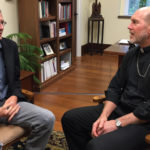A humorous “photo” of Pope Francis wearing an ankle-length white puffer jacket accented by his pectoral cross went viral on social media in March. The fake photo, created through Artificial Intelligence (AI), points to a sobering reality. We need to get serious about the rapidly evolving development of AI and its ethical applications in every aspect of our lives — from home to school to the workplace to the public square and even the Church.
Headlines about AI proliferate in newspapers and other media platforms, many of which acknowledge the possibilities and the problems we must discern and act upon. Pope Francis believes AI has the “potential to contribute in a positive way to the future of humanity” … if “there is a constant and consistent commitment on the part of those developing these technologies to act ethically and responsibly” (vaticannews.com, 3-27-23).
AI is not new technology. Emeritus Stanford Professor John McCarthy coined the term “Artificial Intelligence” (AI) in 1955, according to Stanford University’s website. McCarthy defined AI as “the science and engineering of making intelligent machines” (https://tinyurl.com/27ajchdx). That definition has evolved. AI “is the theory and development of computer systems able to perform tasks normally requiring human intelligence, such as visual perception, speech recognition, decision-making and translation between languages,” the Oxford Dictionary states.
One of the newer developments within the AI realm, ChatGPT, heightens concerns and anxiety. “ChatGPT uses learning algorithms to consume, produce and infer information for human users. The software is intended to mimic human conversation and can instantaneously produce essays and articles, write programming code and give people advice based on information input by users (Catholic News Service, March 23, 2023).
Book authors and news organizations want compensation for their works being used to train AI systems and more than 4,000 writers accuse AI developers of “exploitative practices in building chatbots that ‘mimic and regurgitate’ their language, style and ideas” (Quad-City Times, 7-16-23).
“Just think of the advancements that can be made using AI in robotics and manufacturing, science and mathematics, medical research and healthcare. The possibilities are endless,” financial expert Mark Grywacheski enthuses in his “Mark-To-Market” column in the Quad-City Times. “More specifically, Wall Street is interested in identifying those companies that create AI technology or can use AI to drive their revenue and profits,” Grywacheski said (Quad-City Times, 7-2-23).
Profit alone must not drive this bus or we’re headed for a crash off the edge of a mountain. “A surge of commercial investment in generative AI tools that can write convincingly human-like text and churn out new images and other media” could “trick people and spread disinformation …” (Associated Press, Quad-City Times, 7-22-23).
In the same article, the Associated Press points to an encouraging sign. Major tech companies leading the development of AI technology — Amazon, Google, Meta and Microsoft, among others — commit to meeting “a set of safeguards brokered by the White House … toward managing the ‘enormous’ promise and risks posed by the technology.”
This is the crossroads at which we, people of faith, must pray, learn and act. We begin with the advice that Pope Francis gave to a high-level gathering of technology experts and Church representatives on March 27:
He encouraged the gathering “to make the intrinsic dignity of every man and woman the key criterion in evaluating emerging technologies; these will prove ethically sound to the extent that they help respect that dignity and increase its expression at every level of human life.” A champion of the poor and oppressed, Pope Francis also expressed concern about the evidence to date, which suggests that digital technologies have increased inequality in our world” (Vatican News, https://tinyurl.com/y6uyfp8t).
We must ask, as Pope Francis requests:
- Are our national and international institutions able to hold technology companies accountable for the social and cultural impact of their products?
- Is there a risk that increased inequality could undermine our sense of human and social solidarity?
- Could we lose our sense of having a shared destiny?”
The photo of Pope Francis in the puffer jacket was created in good humor. But even funny misrepresentations must be labeled as fake.
A humorous “photo” of Pope Francis wearing an ankle-length white puffer jacket accented by his pectoral cross went viral on social media in March. The fake photo, created through Artificial Intelligence (AI), points to a sobering reality. We need to get serious about the rapidly evolving development of AI and its ethical applications in every aspect of our lives — from home to school to the workplace to the public square and even the Church.
Headlines about AI proliferate in newspapers and other media platforms, many of which acknowledge the possibilities and the problems we must discern and act upon. Pope Francis believes AI has the “potential to contribute in a positive way to the future of humanity” … if “there is a constant and consistent commitment on the part of those developing these technologies to act ethically and responsibly” (vaticannews.com, 3-27-23).
AI is not new technology. Emeritus Stanford Professor John McCarthy coined the term “Artificial Intelligence” (AI) in 1955, according to Stanford University’s website. McCarthy defined AI as “the science and engineering of making intelligent machines” (https://tinyurl.com/27ajchdx). That definition has evolved. AI “is the theory and development of computer systems able to perform tasks normally requiring human intelligence, such as visual perception, speech recognition, decision-making and translation between languages,” the Oxford Dictionary states.
One of the newer developments within the AI realm, ChatGPT, heightens concerns and anxiety. “ChatGPT uses learning algorithms to consume, produce and infer information for human users. The software is intended to mimic human conversation and can instantaneously produce essays and articles, write programming code and give people advice based on information input by users (Catholic News Service, March 23, 2023).
Book authors and news organizations want compensation for their works being used to train AI systems and more than 4,000 writers accuse AI developers of “exploitative practices in building chatbots that ‘mimic and regurgitate’ their language, style and ideas” (Quad-City Times, 7-16-23).
“Just think of the advancements that can be made using AI in robotics and manufacturing, science and mathematics, medical research and healthcare. The possibilities are endless,” financial expert Mark Grywacheski enthuses in his “Mark-To-Market” column in the Quad-City Times. “More specifically, Wall Street is interested in identifying those companies that create AI technology or can use AI to drive their revenue and profits,” Grywacheski said (Quad-City Times, 7-2-23).
Profit alone must not drive this bus or we’re headed for a crash off the edge of a mountain. “A surge of commercial investment in generative AI tools that can write convincingly human-like text and churn out new images and other media” could “trick people and spread disinformation …” (Associated Press, Quad-City Times, 7-22-23).
In the same article, the Associated Press points to an encouraging sign. Major tech companies leading the development of AI technology — Amazon, Google, Meta and Microsoft, among others — commit to meeting “a set of safeguards brokered by the White House … toward managing the ‘enormous’ promise and risks posed by the technology.”
This is the crossroads at which we, people of faith, must pray, learn and act. We begin with the advice that Pope Francis gave to a high-level gathering of technology experts and Church representatives on March 27:
He encouraged the gathering “to make the intrinsic dignity of every man and woman the key criterion in evaluating emerging technologies; these will prove ethically sound to the extent that they help respect that dignity and increase its expression at every level of human life.” A champion of the poor and oppressed, Pope Francis also expressed concern about the evidence to date, which suggests that digital technologies have increased inequality in our world” (Vatican News, https://tinyurl.com/y6uyfp8t).
We must ask, as Pope Francis requests:
- Are our national and international institutions able to hold technology companies accountable for the social and cultural impact of their products?
- Is there a risk that increased inequality could undermine our sense of human and social solidarity?
- Could we lose our sense of having a shared destiny?”
The photo of Pope Francis in the puffer jacket was created in good humor. But even funny misrepresentations must be labeled as fake.
Barb Arland-Fye, Editor
arland-fye@davenportdiocese.org












